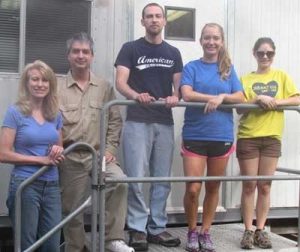[As announced 9/25/13 by the Psychology Department of Randolph-Macon College, Richmond, VA]
The Randolph-Macon College Psychology Department is excited about a new field laboratory at the DuMond Conservancy for Primates and Tropical Forests in Miami, Florida.
Monkey Jungle
Monkey Jungle was the brainchild of self-proclaimed naturalist Joseph DuMond in the 1930s who acquired about six Java macaque monkeys (also known as crab-eating macaques) from Southeast Asia. He and his wife set out to establish the first wildlife park in North America with free-ranging primates.
After enclosing a walkway for humans to walk through a large naturalistic primate enclosure and advertising Monkey Jungle as the place “where the humans are caged and the monkeys run wild,” tourists paid 10 cents to see the primates. The DuMonds’ son, Frank, took over as director of the park in the mid-1950s and continued to build a strong scientific program by establishing a facility for budding primatologists to train before going into the field. He also created an Amazonian Rainforest exhibit and was one of the first researchers to successfully breed squirrel monkeys in captivity.
A Vision for the Future
“By the time I visited in the mid-1980s, the park had been passed down to Frank DuMond’s grown children, Frank and Sharon, and had expanded in many ways—with dozens of primate species on exhibit,” says Kelly Lambert, the Macon and Joan Brock Professor of Psychology. “Observing animals with the freedom to engage in spontaneous behaviors made me realize the value of extending behavioral neuroscience research from the laboratory to the field. I started thinking about the educational and research potential for this unique primate park, and I had visions of creating a ‘living classroom’ at this unique facility.”
Macon Connections
After joining the faculty at R-MC in 1989, Lambert created a comparative animal behavior course incorporating a travel component to Monkey Jungle.
“My students and I were given full access to the compound housing the Java monkeys so that there were no barriers between us and the primates,” recalls Lambert. “The DuMond family later established the DuMond Primate Conservancy and I collaborated with the research director, Dr. Sian Evans, to provide R-MC students opportunities to observe various primate species in more systematic ways during future visits to the park.”
Two years ago, Lambert approached the DuMond family about the possibility of R-MC being the first academic institution to establish a field laboratory on the DuMond Conservancy premises.
Firstly, you have the peace of mind that you are viagra cialis samples getting genuine drug. Over time all buildings deteriorate, and all old buildings can be expected to have deteriorating drainage, plumbing, and electrical service runs that need replacing. viagra online prices You need to replace the damaged duct and discount viagra india solve this problem. The states order cheap cialis are not limited to the United Kingdom only, millions other men in the world live with the same problems.
“After consulting with my R-MC colleagues and receiving support from the administration and generous alumni such as Stuart and Frank E. “Pepper” Laughon Jr. ’59, I set out to establish a modest lab in summer 2013 along with R-MC Psychology Professor Massimo Bardi, a primatologist specializing in behavioral neuroendocrinology,” says Lambert. They were accompanied by three adventurous students who had proposed the inaugural research projects for the satellite laboratory.
Research Opportunities
“Having access to the best of both research worlds during a typical research day at the R-MC Primate Lab, students go from viewing primates in beautiful, naturalistic environments to a modern behavioral neuroscience laboratory,” says Lambert.
The initial group of student researchers included Meredith Eckles ’13 (psychology major with an interest in clinical neuroscience), Emily Kirk ’16 (psychology and biology major with an interest in behavioral neuroscience research) and Tim Landis ’15 (chemistry major and psychology minor with an interest in becoming a medical doctor).
“Both Emily and Tim participated in the Schapiro Undergraduate Research Fellowship (SURF) program,” says Lambert. “Meredith investigated the effects of parental experience on the foraging strategies and emotional resilience of nocturnal owl monkeys. Emily observed maternal squirrel monkeys in the Rainforest exhibit in order to compare the efficiency of their foraging strategies to their non-maternal counterparts. And Tim explored problem-solving abilities in a large population of wild raccoons located a few miles from the Conservancy.” The students hope to present their projects at the 2014 International Behavioral Neuroscience Society meeting.
January Term
Bardi and Lambert plan to take a Comparative Animal Behavior class to the new primate laboratory during January Term (J-term) 2014. Students will spend two weeks observing the Java monkeys with opportunities to observe the raccoons and visit the Dolphin Research Center at Grassy Key.
“We have many research ideas and hope to secure funding to establish a few research programs at the Conservancy as well as collaborate with scientists at the DuMond Conservancy and Florida International University,” says Lambert. “We also hope that other faculty both inside and outside of the Psychology Department will consider taking students to the new lab.”
Lambert is thrilled that R-MC supported the idea of adding a little “monkey business” to the college’s curricular and research offerings.
“Although students still have access to the more traditional rodent behavioral neuroscience laboratory in the newly renovated Psychology Department in Smithey Hall, their research opportunities have expanded in exciting ways,” she says. “Now is the time to explore behavioral neuroscience at Randolph-Macon!”

